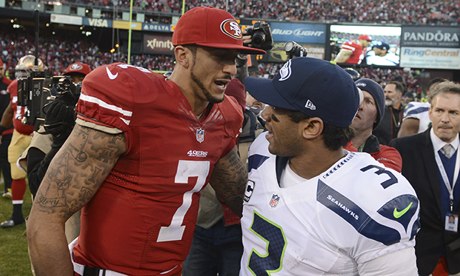
It's been called the "Nerd Bowl" because the teams hail from the hi-tech cities of San Francisco and Seattle. But – excepting perhaps for the cheerleaders – the clash on Sunday between the San Francisco 49ers and the Seattle Seahawks for a place in next month's Super Bowl will be a display of instinctual brutality.
Stoked by a rivalry dating back to the Gold Rush, the game is set to play out a more contemporary regional dispute: the Seahawks are owned by Paul Allen and draw support from Microsoft, the firm he co-founded, and the global shopping behemoth Amazon; the 49ers have established roots not only in San Francisco but increasingly in Silicon Valley, where Apple, Facebook, Google and Twitter have their headquarters.
The 49ers' president, Gideon Yu, is a former Facebook executive who is bringing hi-tech executives into its management as the team prepares to move from Candlestick Park to a new stadium in Santa Clara, next to the famous valley.
Today's game, say sports commentators, amounts to an opportunity to settle scores. In recent years, San Francisco has outstripped Seattle in terms of internet and social-media innovation. After the browser wars of the 90s, Steve Jobs's Apple came from behind to trounce Microsoft with generations of desirable consumer-tech wizardry.
The 49ers also have a glittering history of success in the Super Bowl, with five wins, but on the field that dominance is now not so clearly defined. Allen, who bought the Seahawks in 1997, has bankrolled the creation of a formidable team. While each has won one game against the other this season, the Seahawks have beaten the 49ers by a combined score of 71-16 in their last two matches at home. Still, while both play in a similar style, the 49ers' offense has been stronger toward the end of the season.
"It's a neurotic rivalry because the cities are so similar," says Al Saracevic, sports editor of the San Francisco Chronicle. "They're both liberal cities on the west coast, coffee-obsessed, technology-obsessed and clearly football-obsessed."
The feud, say commentators, is not just play-acting for television. "I don't know anybody in here that likes anybody on the Seahawks. If you find one, let me know," insists San Francisco lineman Alex Boone.
The dislike, it seems, is mutual and the competitiveness between the teams and their fans has been exaggerated by a rivalry between their hard-headed coaches, Jim Harbaugh of the 49ers and Pete Carroll. "They're both good coaches and they've built arguably the best teams in the country," says Saracevic. "Now they're both looking at the Super Bowl – the biggest prize on the table."
But if technology rivalry means little to players on the field, it is more real in the two regions. Seattle prides itself on engineering skills and businesses that seek to establish relationships with their customers, dismissing Silicon Valley's recent tech contributions as social media software designed to gather users' data to sell to advertisers.
But the numbers are clearly in San Francisco's favour. In the first nine months of 2013, Bay Area startups attracted $8.8bn from venture-capital firms. Seattle startups, reports the Wall Street Journal, raised $409m from investors in the same period.
Deep down, says Seattle Times columnist Danny Westneat, the insecurity is real. San Francisco's gold rush came 50 years before Seattle became the jumping-off place for the Yukon. Even in the boomtown of today's Seattle, the city remains envious of San Francisco's wealth, arts, architecture, tech, culture and politics. "For more than 100 years Seattle has played stray dog to San Francisco's alpha," Westneat says.
But for Allen, 60, whose multibillion-dollar fortune stems from writing Microsoft's early code while the better-known Bill Gates made the deals, a Super Bowl title would amount to significant vindication.
After he left Microsoft in 1983, the Seattle native lost billions on mistimed technology and cable-TV investments. A passionate Jimi Hendrix fan, he backs schemes ranging from the search for alien life to space cargo ventures (he is the principal backer of the firm making Richard Branson's space tourism vehicle). But many of Allen's subsequent ventures proved foresighted. A $200m energy pipeline investment returned $2.25bn; he recently sold 11 buildings in Seattle to Amazon for $1.16bn.
Allen's first sports team was the Portland Trail Blazers NBA basketball team, purchased soon after he left Microsoft. Some 15 years later he bought the Seahawks for $194m after the Washington state governor appealed to him as a native son. He subsequently spent $140m building one of the best stadiums in the US (Seattle's fans set a noise record at their stadium when Seattle beat the 49ers in September).
Thanks to a boom in sports sponsorship and the astronomical sums TV networks are prepared to pay for sports broadcast rights, the Seahawks are now valued well in excess of $1bn. At the end of the 2005 season, Seattle got to the Super Bowl for the first time, losing to Pittsburgh. A win in the big game (over the Denver Broncos or New England Patriots) on 2 February could boost that valuation considerably. "If I entered the NBA out of passion, I was called to the National Football League out of civic duty," Allen says in his memoir.
Twenty years ago Microsoft almost left Apple for dead; now Apple is the dominant company, points out Saracevic. "No one could have predicted that." But, he adds: "I can almost guarantee nobody on the teams will be thinking about technology – but echoes of the rivalry will be felt." He predicts the 49ers will triumph. "The Seahawks should win this game but the 49ers seem to be on a roll. If I were a venture capitalist, I'd put my money on the 49ers."

